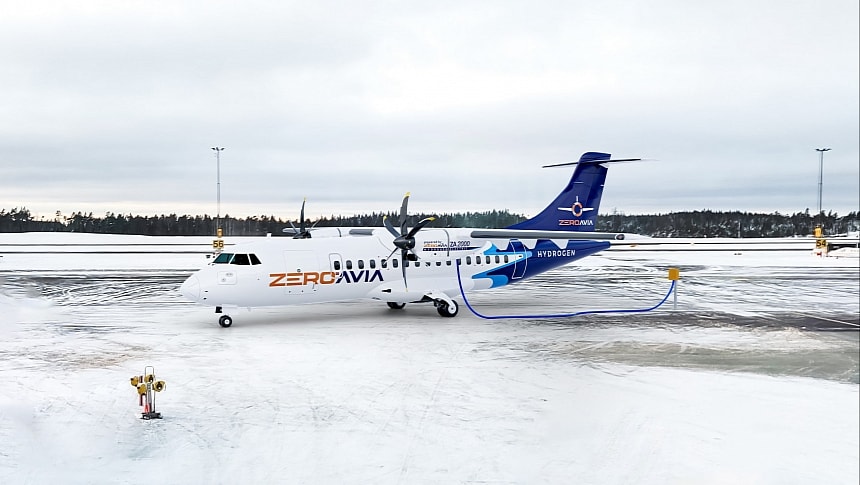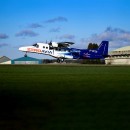The UK Civil Aviation Authority (CAA) has selected three companies that will contribute in a particular way to advancing hydrogen readiness in the UK as part of the government-funded Hydrogen Challenge.
The Hydrogen Challenge was launched in November 2023 in support of the UK Government's Jet Zero Strategy. Just as the UK is supporting innovative, green alternatives for maritime transportation, it's doing that for aviation as well, and hydrogen is one of the solutions considered to have real potential.
This year, the initiative has entered the next phase, known as the Hydrogen Challenge Sandbox, which is all about real-world testing as the necessary step toward establishing a regulatory framework for hydrogen-based alternatives. In particular, the primary focus in this phase has to do with addressing the potential safety issues.
It's no surprise that one of the industry partners selected for this initiative is ZeroAvia. This company is one of the pioneers in hydrogen propulsion technology for aviation, and it aims to ultimately provide a commercial solution for 40-to-80-seat aircraft. Until then, ZeroAvia is already close to securing the official certification for the ZA600, its 600 kW hydrogen-electric powertrain.
The ZA600 has been tested as a retrofit solution, with the Dornier 228 chosen as a flying testbed for campaigns in both the UK and the US. As part of the new Sandbox, the aviation tech company and the CAA will focus on the safety-related aspects of retrofitting existing aircraft with hydrogen-electric powertrains.
The other two industry partners that were selected to participate in the Sandbox phase will focus on different aspects of hydrogen technology. Cranfield Aerospace Solutions is developing new-generation aircraft designed to run on hydrogen and is gearing up for ground- and flight tests. The Exeter Airport Consortium was selected to conduct a deep dive into the efficient integration of hydrogen fuel into ground operations. The Consortium is comprised of several operators and institutions, including Regional & City Airports, TUI, ULEMCo, and Cranfield University.
ZeroAvia has already secured almost 2,000 pre-orders for its innovative hydrogen powertrain, including brand-new airliners that aim to revolutionize the market with all-green fleets. The company's ZA600 version is designed for the 300-mile (482 km) segment, which corresponds to aircraft of up to 19 seats. The most powerful, 900 kW ZA2000 version will ultimately take regional aircraft on an emission-free path.
The ZA600 could prove to be an efficient solution for seaplanes as well. The Spain-based operator Surcar Airlines wants to retrofit Twin Otter STOLs (short takeoff and landing) with this hydrogen-electric powertrain for emission-free tourist travel in the Canary Islands. The UK-based Ecojet, on the other hand, wants to use the benefits of retrofitting in order to become the world's first airline with a fully electric fleet.
This year, the initiative has entered the next phase, known as the Hydrogen Challenge Sandbox, which is all about real-world testing as the necessary step toward establishing a regulatory framework for hydrogen-based alternatives. In particular, the primary focus in this phase has to do with addressing the potential safety issues.
It's no surprise that one of the industry partners selected for this initiative is ZeroAvia. This company is one of the pioneers in hydrogen propulsion technology for aviation, and it aims to ultimately provide a commercial solution for 40-to-80-seat aircraft. Until then, ZeroAvia is already close to securing the official certification for the ZA600, its 600 kW hydrogen-electric powertrain.
The ZA600 has been tested as a retrofit solution, with the Dornier 228 chosen as a flying testbed for campaigns in both the UK and the US. As part of the new Sandbox, the aviation tech company and the CAA will focus on the safety-related aspects of retrofitting existing aircraft with hydrogen-electric powertrains.
The other two industry partners that were selected to participate in the Sandbox phase will focus on different aspects of hydrogen technology. Cranfield Aerospace Solutions is developing new-generation aircraft designed to run on hydrogen and is gearing up for ground- and flight tests. The Exeter Airport Consortium was selected to conduct a deep dive into the efficient integration of hydrogen fuel into ground operations. The Consortium is comprised of several operators and institutions, including Regional & City Airports, TUI, ULEMCo, and Cranfield University.
ZeroAvia has already secured almost 2,000 pre-orders for its innovative hydrogen powertrain, including brand-new airliners that aim to revolutionize the market with all-green fleets. The company's ZA600 version is designed for the 300-mile (482 km) segment, which corresponds to aircraft of up to 19 seats. The most powerful, 900 kW ZA2000 version will ultimately take regional aircraft on an emission-free path.
The ZA600 could prove to be an efficient solution for seaplanes as well. The Spain-based operator Surcar Airlines wants to retrofit Twin Otter STOLs (short takeoff and landing) with this hydrogen-electric powertrain for emission-free tourist travel in the Canary Islands. The UK-based Ecojet, on the other hand, wants to use the benefits of retrofitting in order to become the world's first airline with a fully electric fleet.







